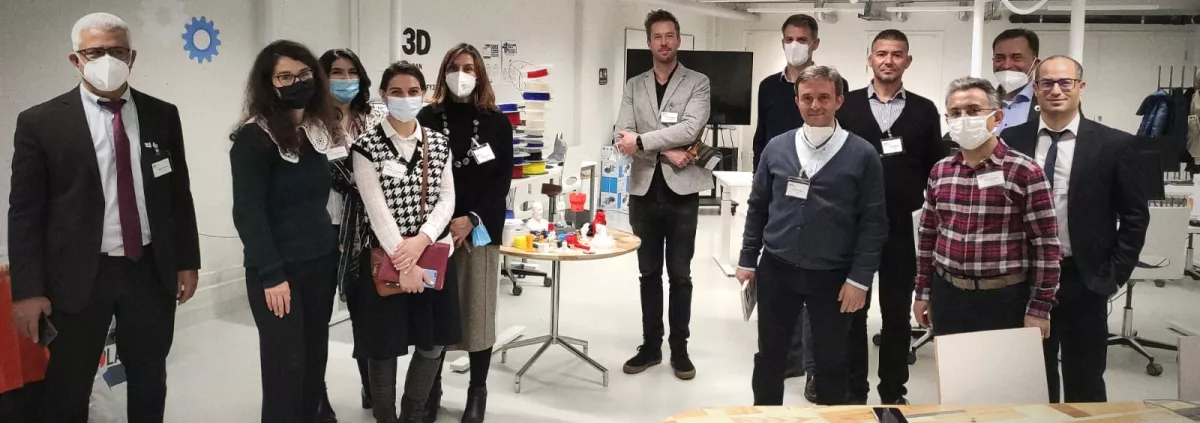In the framework of the ETF Network of Excellence, under the sub-initiative on Autonomy and Public-Private Partnerships (PPPs), the European Training Foundation in cooperation with Omnia Education Partnerships hosted a study visit on November 17-19 in Helsinki and Espoo region for members of the ETF Network of Excellence from Georgia, Turkey, Tunisia, Morocco and the Netherlands. The small group of eight people consisted of both VET providers and policy makers.
This peer learning activity focused on knowledge exchange of the autonomy of VET centres, as well as new good practice developments in PPPs, inspired by practices from the Finnish system.
Each day offered a different point of view toward excellence in autonomy and PPPs:
- Day 1 was dedicated to innovation and co-creation with the private sector. The participants visited Omnia Makerspace and AGrid – the creative community of startups and partners on Aalto University Campus.
“It was an opportunity to experience the vibrant entrepreneurial spirit of the place where people get together to co-create and innovate”, said Leigh Ewin, AGrid Community manager
- Day 2 focused on Omnia, the Joint Authority of Education in the Espoo Region and VET in Finland on the example of Omnia. It started with the campus tour, by visiting different practical learning environments and it continued with several sessions about Omnia, including continuous learning models, development of learning projects and a workshop on research cases. The participants got to learn about VET in Finland through Omnia model.
Terhi Haapaniemi, manager at OMNIA, emphasized how “participants learned that VET in Finland is very flexible and competence based”. Moreover, Finnish VET providers ensure work-based learning and integration into the labour market. This is possible since the training providers and the companies in the region are working together through an open dialogue. “50% of students are adults which means that VET is attractive for different age groups and has something to give at any stage of your career. Each student has a personal study plan to match their professional goals and prior learning”, added Ms Haapaniemi.
- Day 3 was an opportunity to approach the “policy side” of autonomy and PPPs. Participants met representatives from the Ministry of Education and Culture and the National Agency for Education, to discuss the level of autonomy in the Finnish VET system and all regulatory aspects in PPPs. VET in Finland is fully supported by the government in many ways and it is autonomously run by the provider.
Participants highlighted that that they were very amazed by the degree of the autonomy in Finnish VET system and how every stakeholder – whether a VET provider, government or a private company - is able to take their fair share of responsibility to make a fruitful collaboration.
“It was a truly inspiring and insightful week”, said Anis Chetiti, Development Manager at the Centre of Bizerte, Tunisia.
The next event of the ENE sub-group on Autonomy and PPPs in VET is planned for the 25 January 2025. ETF will continue to foster knowledge sharing and good practices exchange among all network members through an on-line event. More info will follow.
To know more about the outcomes of the ETF baseline study in this field, you can download the publication from the ETF website (LINK).
To learn more about Omnia and VET in Finland, please check the virtual study tour videos.
---------------------------------
Centres of Vocational Excellence (CoVEs) are vocational institutions recognised for excellence in identifying and imparting relevant, high-quality, specialised technical skills. They are innovation hubs with strong ties to industry and business. They strive to provide exemplary initial training for young people and continuing education for adults, guiding them as they upskill and reskill through flexible, timely training programmes designed to meet the skills companies need.
Created in December 2020, the ETF Network for Excellence (ENE) is a platform designed to encourage knowledge sharing, namely the continuous exchange of best practices among new and existing CoVEs at local, national, and international levels. ENE builds bridges and partnerships with other CoVEs within the EU and beyond and covers eight priority areas.
8 ENE priority areas:
• Work-based learning (WBL)
• Entrepreneurial Centres of
Vocational excellence
• Pedagogy and professional
development
• Smart specialisation
• Industry 4.0 and digitalisation
• Autonomy and public-private
partnerships
• Going green
• Social inclusion and equity

Dear Khalid, the Network is open for VET Centres , so if you want your centre to apply for it, please contact etf.network.for.excellence@etf.europa.eu
They will provide you due instructions. Regards,